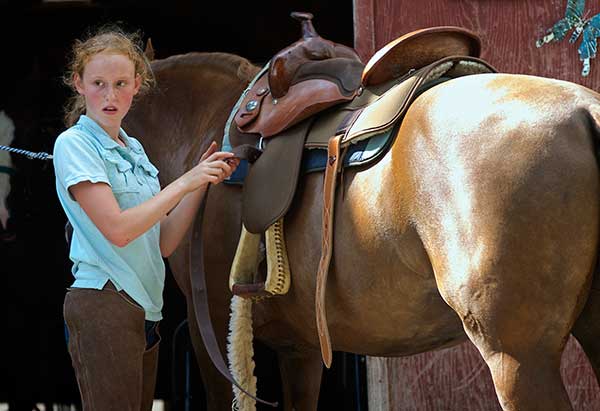Everything you need to know about horse therapy
More and more Canadians are horsing around with their healthcare. Horse therapy, also known as equestrian or equine-assisted therapy, is a versatile treatment program that has patients galloping to ranches and stables to recover from all kinds of medical conditions.

By Al Donato, CBC News February 23, 2017
For the children and young adults featured in CBC documentary Free Reins, these large therapy animals make the perfect hooved friends to guide them through life’s challenges. But hold off trading your doctor visits for riding lessons just yet. Here’s what you need to know about horse therapy before getting on the saddle:
| Origins |
Hippocrates, commonly referred to as the father of modern medicine, wrote about equine-assisted therapy being used in ancient Greece. Therapeutic riding rose to prominence in the 1950s and 1960s in Europe, bolstered by Danish Olympic dressage silver medallist Lis Hartel, who claimed riding helped her recover from polio.
| How Horse Therapy Works |
Horse therapists say feeling the physical cadence of a horse can stimulate one’s muscles and spine. Based on what they’ve seen, horseback riding helps with motor skills, balance, coordination, and physical rehabilitation.
Horse therapy can take many forms. For those who prefer staying on the ground, equine-assisted therapy includes activities such as grooming, petting, and feeding. Otherwise, programs may feature vaulting over small obstacles, trotting or riding in a horse-driven carriage.
| Who Uses Horse Therapy? |
| PTSD Sufferers |
| Veterans, first responders, and domestic abuse survivors are among those who say they’ve found relief for PTSD symptoms through therapeutic riding. In an interview with CBC News, a former RCMP officer with PTSD said horse therapy helped him with trauma, as well as assisted his wife’s cancer recovery. |
| Movement Disorders |
| The steady action of riding has benefited people with movement disorders like cerebral palsy. |
| Autism |
| Riding can be a getaway away from overwhelming everyday life which can benefit those dealing with sensory overload. At Hinchinbrook Farm, featured in Free Reins, many of their clientele are families with autism. |
| Mood Disorders |
| Horse therapy clinics often specialize in improving mood and facilitate relaxation, which can help those living with depression, anxiety, anger management, and grief. |
| At-Risk Youth |
| Programs for at-risk youth and substance use recovery have also been offered by horse clinics. |
| People Who Don’t Like Talk Therapy |
| For people who are non-verbal or don’t like chatty counsellors, speech isn’t necessary to get along with a four-legged shrink. |
| Why Horses? |
Unlike smaller therapy animals like dogs and cats, these gentle giants have a calming effect that’s magnified by their size and empathy. Horses are herd animals known for attuning themselves to human emotion, often reflecting the behaviours of those around them. For people building confidence, learning to lead around animals that loom over them can help improve self-esteem, encourage taking control, and addresses fears they feel are bigger than them.
Therapeutic horses are typically mares and neutered male horses. They’re selected based on how reliable they behave and their demure demeanours. Old horses are often used for this reason.
| Does It Work? |
Medical professionals have given horse therapy mixed responses.
Most major studies claim there’s insufficient scientific evidence that equine-assisted therapy effectively treats psychiatric or behavioral disorders, or reduces pain associated with physical disabilities.
Emerging Canadian research hints at promising results. A joint pilot project by the University of Regina and the University of Saskatchewan found that therapy participants all experienced a sense of love and happiness when around horses, according to CBC News.

Roze McDormand and Dandy get ready to ride. CBC TV
| Horse Therapy In Canada |
There are few regulations in this growing practice, nor any mandatory training. Clinics operate independently, or in association with professional bodies. The international organization Equine Assisted Growth and Learning Association has certified 20 programs across the country. The Canadian Therapeutic Riding Association is a national charity that has been running since 1980, and has accredited 80 centres and hundreds of instructors from coast to coast. How much sessions cost vary from practice to practice and some can be reimbursed by insurance plans.
Some programs are even backed by the federal government. Veteran Affairs Canada has sponsored a horse therapy program for veterans living with PTSD, the Calgary Sun reports. As well, the Department of Justice funded a pilot project that used equine-assisted therapy to help Ontario youth struggling with drug use.
| What To Look For In A Horse Therapist |
Without any standardized measures, it’s up to patients to ask the right questions before enrolling in equine treatment programs.
A therapist’s credentials and equine expertise will indicate if they are able to provide adequate healthcare. Also look for whether they are associated with any professional organizations or have received funding from credible sources.
![]() Source CBC News
Source CBC News
Also see
Lesson Horses Can Teach Us CBC
Why Hinchinbrook, a horse farm in Nova Scotia, is such a special place CBC
Study finds horse therapy helps patients focus, feel positive CBC News
Study on horse therapy shows promising results Kamsack News
Federal government gives funding boost to Alberta horse therapy program for military veterans The Calgary Sun
